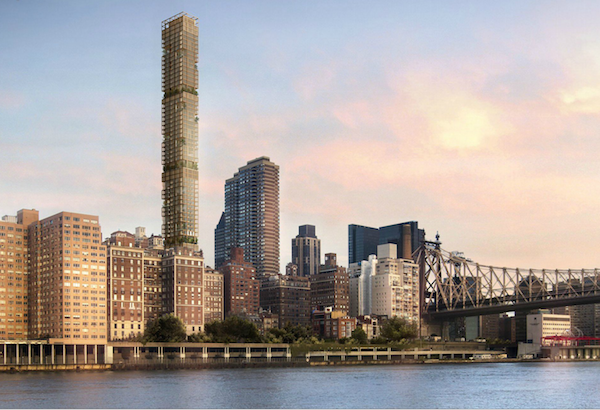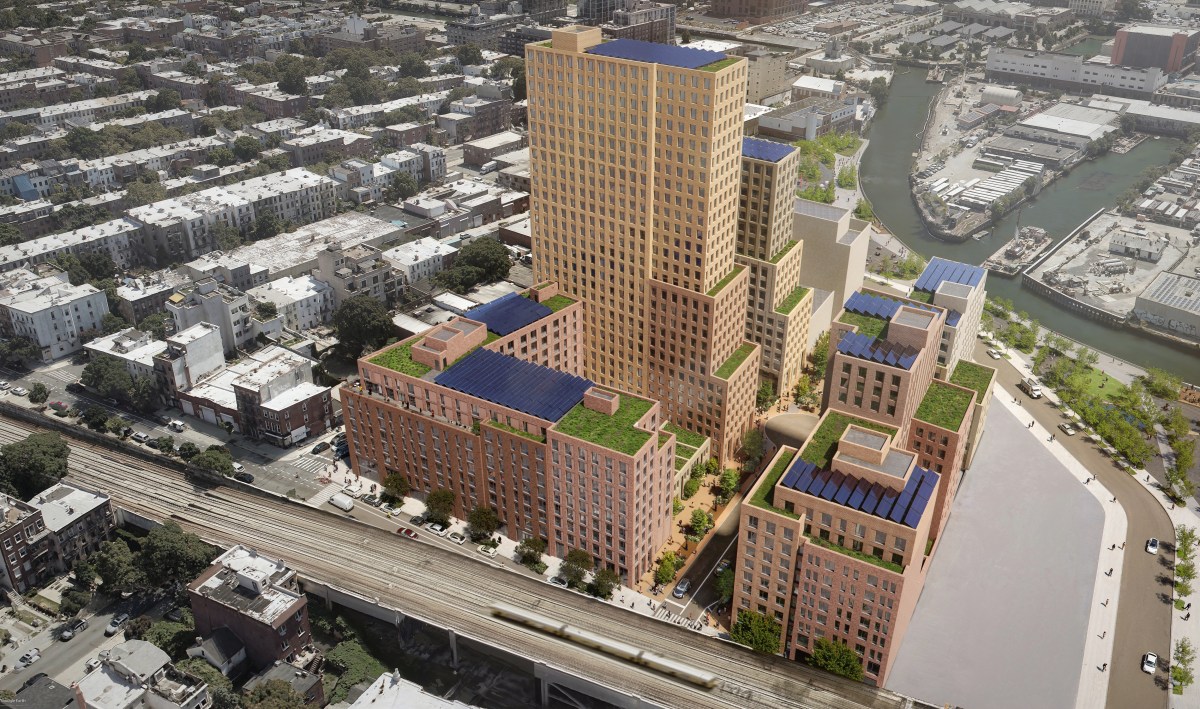
BY JACKSON CHEN | A local organization filing a rezoning proposal for their neighborhood say they have won a victory — at least temporary, and perhaps significant longer term — due to the recent financial troubles of the developer behind the proposed 90-story 3 Sutton Place skyscraper.
The East River Fifties Alliance, on January 21, filed a preliminary rezoning statement to restrict the area from East 52nd Street to East 59th Street and from First Avenue to the East River to a 260-height limit, or approximately 25 stories. No construction permits have yet been issued for the Sutton Place project, and ERFA is hopeful rezoning could be in place before the super tower construction can begin.
ERFA, its planners and attorneys, and representatives from supportive elected officials had an initial meeting regarding the rezoning proposal with the Department of City Planning on February 26. The department said the meeting was a standard procedure it offers to applicants, providing technical assistance and guidance to help them complete their paperwork.
Although their proposal is still in the pre-application phase, Alan Kersh, ERFA’s president, said he felt the department was very receptive to their rezoning proposal.
“We believe there’s a recognition on City Planning’s part that a mega tower in a truly residential neighborhood might not be appropriate,” Kersh said. “So they are taking this request… very seriously.”
Kersh added that they’re expecting follow-up meetings between their planners — Douglas Woodward and Sandy Hornick — and the department that delve into the technical details of the rezoning proposal.
Chris Rizzo, an attorney from Carter Ledyard & Milburn LLP who represents EFRA, concurred that they’ve received good signs from the planning department and hope to move the process along quickly.
According to Rizzo, the organization’s team has now met with City Planning for both an initial informational meeting and an interdivisional meeting, where various units within the department informally offer assessments of the proposal.
So far, the planning department has asked ERFA about alternative approaches to its proposed height restrictions and whether the group’s proposal for an affordable housing component is necessary, Rizzo said.
As the meetings continue, the organization will continue its back-and-forth with the planning department until they reach the point where a completed application can be submitted. EFRA, the attorney emphasized, is willing to be flexible as long as the group can achieve its main goal.
“East River Fifties Alliance is very open to achieving height restrictions in a different manner than what we proposed,” Rizzo said. “The only bottom line is there has to be height protection.”
On top of a height restriction, ERFA’s rezoning proposes incentives to developers who provide affordable housing and build community-oriented spaces as part of a contextual project.
While the organization continues its push for a rezoning, the developer whose project has drawn so much ire has been inundated with legal problems stemming from a hefty loan to finance construction of the proposed super tower, which was planned for East 58th Street.
The developer, Bauhouse Group, defaulted on its $147 million loan from Gamma Real Estate in January, according to Crain’s New York, prompting a foreclosure auction on the property to be scheduled for February 29. With that deadline looming — and a court declining to issue a temporary restraining order against it — the limited liability corporation controlled by Bauhouse that owns the property filed for Chapter 11 bankruptcy protection on February 26, as reported by Crain’s.
On top of the legal back-and-forth between Bauhouse and Gamma, the developer is also being sued by JLL, a commercial brokerage firm that helped Bauhouse in its purchase of the 3 Sutton Place property, according to The Real Deal.
On top of all that, Nathaniel Christian Group, another commercial real estate firm, is suing Bauhouse for $600,000 for a missing commission payment for its help in Bauhouse’s purchase of the property for its only other project, known as 515 Highline and located at 515 West 29th Street, Crain’s reported.
Bauhouse, led by managing member Joseph Beninati, was founded in 2012 with Chris Jones and Danny Lee — both former employees of JLL. Similar to the Sutton Place development, the 515 Highline project has yet to be finished, despite an expected completion date of December 2015.
Beninati was interviewed by the New York Times in May 2015 and said demolition on the Sutton Place site would begin that summer. However, the three buildings expected to be demolished still stand today, with the construction process likely stalled due to Bauhouse’ legal and financial problems.
Bauhouse, through its press representative, the Marino Organization, declined comment on its two prospective projects.
With the bankruptcy filing buying time for the developer, Kersh said ERFA is wary of what might come next. Even if Bauhouse is unable to move forward on the project, neighborhood advocates are concerned that the developer selling the property or Gamma seizing control of the lot could expose the neighborhood to unwelcome development that can be carried out as of right under existing zoning.
“Odds are the next developer may have more financial resources than Bauhouse,” Kersh said. “The goal is to get [the zoning] changed before a new developer comes in who maybe has better resources and better ability to get a site assembled.”
For the organization trying to block the construction of a skyscraper in their neighborhood, the recent legal disputes only offer them a head start.
“We can’t take our eyes off the ball while this drama is playing out,” Kersh said. “We’re just plowing ahead with City Planning and moving forward with the rezoning as soon as possible.”
Kersh said the pre-application process usually lasts anywhere from 18 to 24 months, but he expects his group’s proposal to take a year. To compile a final application, the ERFA’s team must meet with the City Planning Commission for initial discussions, file an environmental impact report, and go through a public comment process.
After clearing those hurdles, the rezoning would move into the Uniform Land Use Review Procedure phase, which can take up to another year. Here again, Kersh predicted that with strong support from local elected officials, his group can move more expeditiously.
City Councilmember Ben Kallos — who co-signed the preliminary rezoning statement alongside his colleague Dan Garodnick, Borough President Gale Brewer, and State Senator Liz Krueger — said that time is now on their side in pushing through the rezoning.
“We knew this rezoning would move faster than they could build,” Kallos said. “This bankruptcy filing will only draw the process out for years and give the community the time it needs for this rezoning.”
Community Board 6 has also offered its endorsement, passing a resolution supporting ERFA’s rezoning efforts at its February full board meeting. After ERFA met with CB6’s Land Use and Waterfront Committee earlier in February, the board agreed to reaffirm support for the rezoning it had first voiced last May.
As for the race between ERFA, in getting its rezoning approved, and the developer, hustling to lay down a foundation, Kersh said his organization is doubling down on its efforts to maintain its lead.
“Whatever is going on between the lender and Bauhouse will take its place in time,” Kersh said. “But our mission is not missing a day or beat on the rezoning effort.”

















